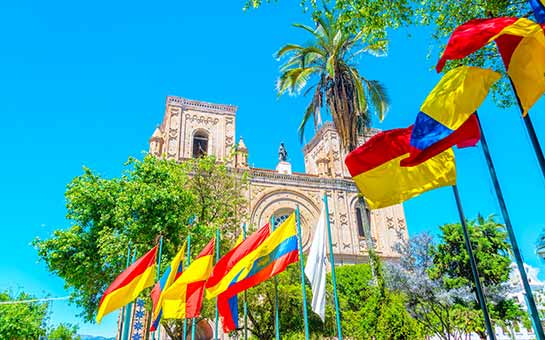Ecuador is sandwiched between the Andes Mountains and the Pacific Ocean. It has no less than three climate zones – tropical, dry sierra, and humid rainforest.
The South American nation is a favorite destination for those seeking to move abroad. The virgin beaches along the Pacific, the towering Mt. Chimborazo, and an extremely affordable lifestyle are just a few of the features that make it unique. If you are looking for a clean, healthy place to live with plentiful natural resources, Ecuador is a natural choice.
The biggest question that expatriates have when moving to Ecuador is about the state of healthcare. It is natural to be worried about one’s well-being in a foreign land. Falling ill abroad is not a matter to be taken lightly. Here, we present a detailed look at the Ecuadorian healthcare system, and we advise you to purchase expatriate health insurance before you move.
Ecuador Public Healthcare System
Ecuador has a universal healthcare system. It is funded by the government and provides treatment to all.
The major cities, such as Quito (the capital) and Guayaquil, have public hospitals. Treatment is free, and anyone can visit for examination by a general practitioner or a specialist, depending on the malaise. The general hospitals focus on pediatric care, gynecology, and surgery. There are also government-run clinics that are more specialized, such as those for cancer (known as SOLCA) and psychiatric hospitals.
Each of the smaller towns has comprehensive healthcare centers that are able to treat less threatening problems. If patients require treatment or minor surgery that does not need overnight stay, they visit day hospitals, or Centros de Salud.
Overall, the system has been designed to extend health benefits at no cost to as many of Ecuador’s 16 million citizens as possible.
Ecuador Healthcare System Problems
The system is overburdened. That is the inevitable fate of public healthcare systems in many developing countries. Despite the best intentions of the administration, Ecuadorian public healthcare is unable to keep up with the demands of an aging population. The worst part is the long wait to find a specialist and receive surgery.
To add to its woes, there is a lack of trained medical professionals. Many prefer to migrate to better-paying jobs in Argentina and Brazil, two of the wealthier nations in South America.
Ecuador’s Private Healthcare System
Since the state-run health plan Instituto Ecuatoriano de Seguridad Social (IESS) is under severe strain, the government decided to make private healthcare mandatory in 2017. If you’re an expat, expatriate health insurance would meet this requirement.
This applies to all residents and those who work in the country subject to a maximum age of 65 years. The laws are quite gentle upon the customer, making it impossible for insurance companies to refuse patients based on pre-existing conditions. There has been a sharp rise in new private hospitals in Ecuador. These have been opening all over Quito, Salinas, and Cuenca.
The standard at these hospitals is quite impressive. Naturally, quality comes at a price. The expense, however, can be conveniently settled through a health insurance policy for expats in Ecuador.
Ecuador Expatriate Health Insurance
Before you move to Ecuador, you obviously need to buy expatriate health insurance. However, it is not as simple as paying a premium and picking up a policy. It would be better to buy one that provides you with the most comprehensive coverage that you could ask for.
To many, the fine print is quite hard to understand. We demystify the jargon you will face when buying an Ecuadorian expat medical insurance policy.
- Medical evacuation – You might decide after a diagnosis to be treated in Brazil, or even the U.S. This requires you to be moved under medical supervision and is known as medical evacuation. Usually done by air, it is quite expensive, and, naturally, your health insurance policy should cover the expenses.
- Repatriation – You might seek to return to your nation of origin for treatment. If the malaise is difficult, one likes to have familiar faces around, and family is essential. To return to your home country, you would need a policy that allows repatriation expenses. Evacuation and repatriation should be at the top of your mind if you are buying a policy for healthcare in Ecuador.
- Translation – The language spoken most commonly in Ecuador is Spanish. This means your test reports wouldn't be understood even in Brazil, where the most common language is Portuguese. The same applies if you are evacuated or repatriated. Policies that allow for translation are the best ally you have here. Make sure when you buy that your plan includes this crucial benefit.
- Domiciliary Hospitalization – Your treatment might not be severe enough to need extended hospitalization. If you have broken your leg, you can safely rest at home for three months. However, you would need a trained nurse and a physiotherapist. Some policies pay for domiciliary hospitalization, which covers expenses for treatment at home.
- Critical Care – Do you need critical care coverage? Usually, this applies to grave problems such as cancer and strokes. If you feel that you are healthy enough to give this clause a pass, you can do so. It will help you save on premium costs, since these diseases cost most to treat. In its place, you could opt for dental care or simply a more considerable sum insured.
Stay Healthy with Expat Health Insurance for Ecuador
The discussion above is not meant to make you pause. Go ahead and buy the expatriate medical insurance coverage that you desire. Compare several policies from different companies and choose the one that best fits your needs. Make sure that the add-ons you want are present, and then purchase.
With your brand-new policy, you are ready to relocate to Ecuador and enjoy a fun-filled expat life.
